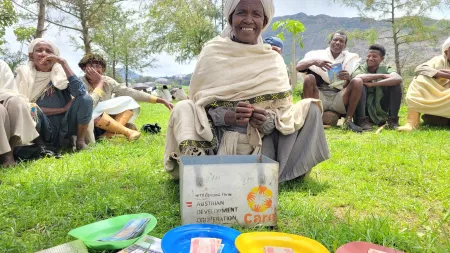First comes the chicken, then the goats, then cattle, and then sometimes a shop. This is how many rural communities raise their livelihood in Ethiopia. “My life was difficult before I was able to receive a loan,” says Tsehan, 54, mother of four children. She is the sole family breadwinner, as her husband died a few years ago. Tsehan is a project participant in a CARE Program.
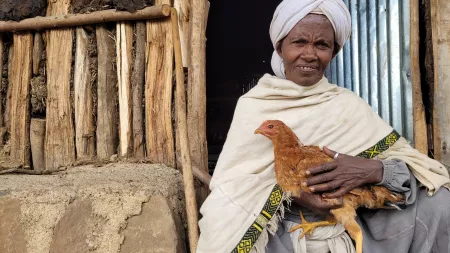
Loans for chicken
The aim of the project is to open the way to new perspectives and thus greater economic independence for women and men by involving them in small savings groups. The group members save a certain amount of money each month and give out loans to members to help them with their businesses. Tsehan bought two hens with the loan. “Now I sell their eggs for 10 Ethiopian Birr (0,20€). I can cover all my expenses with the sale because there is a high demand for eggs. I have a good income now”, says Tsehan while holding her two hens, both of which will have chicks soon, giving Tsehan another source of income.
Before, I borrowed money from neighbors and friends or had loans with high-interest rates. But now I have a plan. I can work with even a little money.Tsehan Dagnew, Ethiopian farmer
Once she has enough chickens, she will sell them and buy goats. Just as Ewuntu, 48, did.
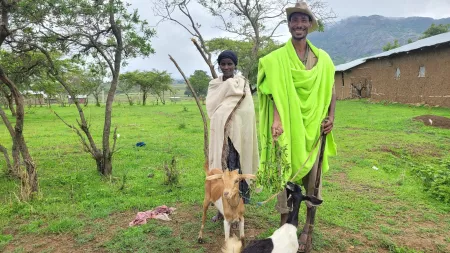
Within three months, the father of five children sold his chicken and bought two goats. He has a disability and has trouble walking. “Before I was a member of this group, I did not participate in community activities, but now I feel like an equal,” Ewuntu says. He is a farmer, and the crops from his fields are his main income source, as he never had any livestock.
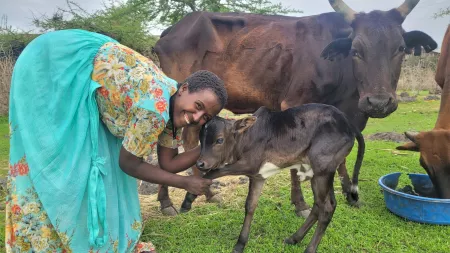
Cows help to feed children
“I started with two chickens from the loan of the savings group. Then I sold them and bought a goat. Once I had nine goats, I sold them and bought a cow,” Fenta, 26, mother of three, says. Her journey started with the chickens three years ago. Now her first cow already has a calf. “The milk from the cows helped me feed my children, and I can sell it on the market,” Fenta explains. When she has four cows, she wants to sell them and move closer to town to open a restaurant.
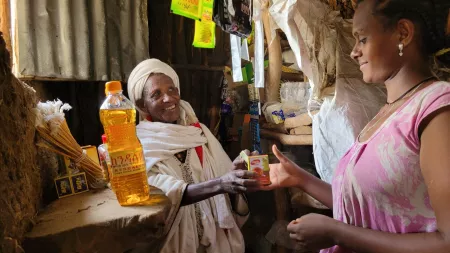
“The small savings group is a good way to get a loan and save,” Tarik, 72, a small shop owner in the village says. With the loan, she was able to expand her shop and now has a profit and can pay for all her expenses. “I live alone. It was always difficult to sustain my livelihood. With the profit from the shop, I have a better life, and I was also able to buy chicken and medications for my health,” concludes Tarik.
Increasing pocket money
As the prices are increasing all over Ethiopia, an extra income is very important for these women and families. The seeds for farming are six times as expensive as they were three years ago. The price for a pair of shoes is eleven times more expensive. “The rise in prices decreases our profit,” explains Fenta. Additionally, the current drought affects the farmers. The loans from the small savings group and the profits from the chickens, goats, cattle, and shops increase the pocket money of the community members, which helps them face the effects of the drought and price increase.
We also have social bonds with other women in the community.Fenta Beleta, Ethiopian farmer and participant in the Savings Group supported by CARE
Before, she stayed mainly at home and took care of the household. “The first time I went to a group meeting, my husband asked me where I was going. I showed him what we do there and explained how important it is to save money. He understands now and is very glad that I contribute to our livelihood. Before, we were ignored. Now we are seen,” Fenta concludes.
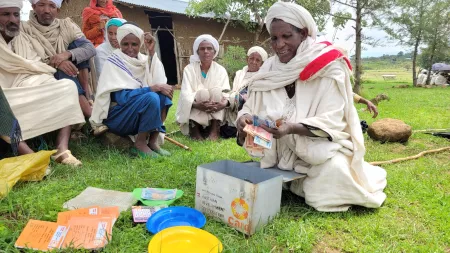
The Village Savings and Loans Association (VSLA) is a successful practice implemented across CARE International programs that stimulates the creation of saving groups within communities. Savings groups are self-managed groups of 15 to 25 people who meet regularly to save their money in a safe space, access small loans, and obtain emergency insurance.
Learn more